
О.В.Борисова Английский язык
.pdf
18
It’s a fully furnished flat on the ninth floor of a new building. There are two bedrooms, a cosy living room with a large balcony, a well equipped kitchen and a bathroom. The flat has very big windows, so it’s bright and airy, and you have a beautiful view of the city.
Rent this nice two bedroom flat. It’s perfectly situated next to
1the city university, five minutes from the city centre, and a fifteen minute walk from the city park.
This flat is great for students or young couples. Sorry, no pets, and no smoking.
The neighbourhood is perfect for young active people. There is a stadium, a sports complex, night clubs and cafes. A popular supermarket is five minutes away from the house, and a bus stop is right behind it.
8.2Write out the adjectives describing the flat and neighbourhood. Check the meanings with a dictionary. Think of more adjectives to describe a place.
e.g. cosy, perfectly situated
8.3 Write an advert of your flat (real or imaginary) for the website. Plan what you are going to write. Try to answer the following questions.
a.What kind of flat is it? Where is it?
b.Describe the flat, its rooms, furniture.
c.Describe the neighbourhood. Are there places of interest, entertainment, shops, public transport?
d.Say who the flat is suitable for? Are there any restrictions?
OVER TO YOU:
1.Can you describe your flat/a flat you know?
2.Can you say what there is in your room?
3.Can you describe your neighbourhood?
4.Can you describe a dormitory/hall of residence room in your university?
11
Module 2
A PLACE LIKE HOME
Order the letters to make places in a house.
c h i t k e n b o o m r a t h v i g l i n o r o m r e m b o o d l o i t e t c y l b o n a
Can you name two things you can find in these places?
1. |
Pronunciation |
|
|
Listen and repeat the phrases. |
|
|
|
|
a. in the room |
e. |
on the shelf |
|
b. in the house |
f. |
on the balcony |
|
c. in the flat |
g. on the stairs |
|
|
d. in the kitchen |
h. on the floor |
|
2. |
Vocabulary and listening |
|
|
2.1 Look at the plan of a flat and label the rooms.
2.2 Listen and repeat.

12
Look at the rooms in 2.1. What’s in them? Complete the lists. |
|
||||
|
|
|
|
|
|
in the kitchen |
in the … |
in the … |
in the … |
in the … |
on the … |
|
|
|
|
|
|
cupboards |
________ |
________ |
________ |
_________ |
_________ |
________ |
________ |
________ |
________ |
_________ |
_________ |
|
|
|
|
|
|
2.3 Louise and Harry are American tourists in England. They want to rent a house for the summer. Cover the dialogue and listen. Which three rooms in the house do they go into?
Listen again and complete the dialogue.
Estate agent: |
Well, this is the hall. There are six ____ on this floor. |
|
There’s a ____ , a dining room, a ____ , a study, a ____ … |
Harry: |
Wow! There’s a ____ ! |
Louise: |
What’s that room? |
Estate agent: |
That’s a ____ , madam. |
Harry: |
How many ____ are there? |
Estate agent: |
There’s one downstairs and three upstairs. |
Louise: |
Are there any showers? |
Estate agent: |
No, there aren’t, madam. This is an old house. |
Estate agent: |
This is the ____ . |
Louise: |
Are those paintings original? |
Estate agent: |
Yes, I think so, madam. |
Harry: |
Is there a ____ ? |
Estate agent: |
No, there isn’t, sir. But there’s a piano. |
Estate agent: |
And the ____ . |
Louise: |
There isn’t a ____ ! |
Estate agent: |
Yes, there is. It’s over there. |
Louise: |
You call that a ____ ? Are there any glasses? I need a glass |
|
of water. |
Estate agent: |
Yes, madam. There are some glasses in that ____ . Now let’s |
|
go ____ . |
3. Grammar
3.1 Complete the sentences about the house from 2.3 with is, isn’t, are and aren’t.
There ____ a piano. |
There ____ six rooms on this floor. |
There ____ a fridge. |
There ____ any showers. |
___ there a television? – No, there ___. |
____ there any glasses? – Yes, there ____. |
|
|
17
6. Conversation patterns
Read the phrases and place them in the table.
How about this one? I don’t like it. I prefer the first one. It’s great! What about the second one? I like it. The last one is better. It’s too expensive. Which one do you like? It’s too far. I suggest this one. It’s too small. What do you think?
Suggestions |
Opinions |
How about this one? |
I don’t like it. |
… |
… |
7. Speaking
7.1Read more adverts from Studentrooms.co.uk. Which one do you like best?
1.Extra large room in a friendly house with the host family. The room is bright and airy, fully furnished with double bed, night stand, lamp and wardrobe. Communal shower room, kitchen, dining area, TV area. 25 min to the train station. £433 a month.
2.One room flat to share. One sofa, one bed, two tables, TV, wireless Internet. City centre. 5 min to university. £120 per person.
3.Ground floor large room, single bed in family shared house. Fully furnished including own fridge, TV and wireless Internet. Shared bathroom and kitchen areas, large garden and parking. 10 min to university by bus. Pets allowed. £310 a month.
4.Two lovely rooms to let. No furniture. Central heating, hot water all year round, lift. Bus stop next to the house. Supermarket, park, stadium in the neighbourhood. £560 per room.
7.2Work in pairs. You are going to rent a flat for two. Discuss the adverts from 6.1 and agree to rent one of them. Act out this conversation. Use the conversation patterns from 6.
8. Writing
8.1 Read the advert from a website. Arrange the parts of the advert in the correct order.
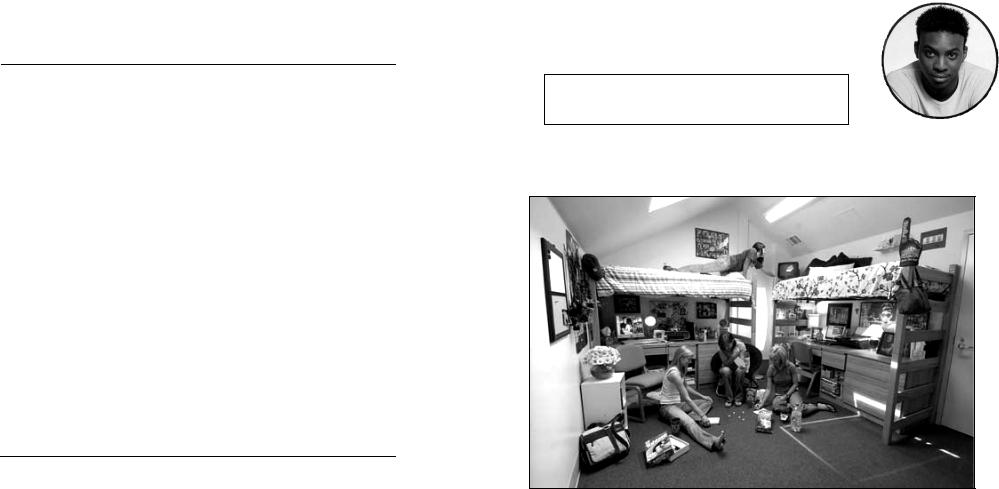
16
5. Reading
5.1 Read this advert from a site where students can find rooms for rent. Check the meaning of the underlined words with a dictionary.
Studentrooms.co.uk
Room for rent in a nice big house
We are offering a room for rent in a nice big furnished house. The house has three floors:
1 a huge living room with a digital TV, surround system, fireplace, big dining table, sofa, armchairs, coffee table; a well equipped kitchen and a bathroom;
2 two bedrooms, occupied by Erasmus University students and a bathroom with a shower;
3 the bedroom offered for rent: a huge king sized bed, desk, arm chair, coffee table, night stand and clothes shelves.
The house has front and back yards with a barbecue and some garden furniture. Parking is free. Everything is well equipped: there’s central heating for the bedrooms, a dish washer, washing machine, hair dryer, microwave oven, coffee machine.
The neighbourhood is very peaceful: mostly families with children. There is a beautiful park with a lake and a beach next to the neighbourhood. Shops are located in 10 minutes’ walk. You can go to Erasmus University by metro, and Alexandrium shopping center is within 5 minutes’ walk. We also have a bicycle that you can use.
Address: 17 Raymond Brulezpad, Zevenkamp, Rotterdam, 3069JX.
5.2Mark the statements true or false.
a.There’s no furniture in the room for rent.
b.The room for rent is on the third floor.
c.There are no other people living in the house.
d.There are mostly student houses near the house.
e.There’s a metro station in the neighbourhood.
f.There are some shops near the house.
5.3Cover the advert and try to remember the details about:
a.the room for rent
b.the house
c.the neighbourhood
13
3.2 Listen to Rory describing his room. Make sentences about his room, use the words from the box. Listen again and check. e.g. There is a sofa in his room.
sofa |
armchair |
table |
PlayStation |
book |
picture |
poster |
lamp |
Make six sentences
about your room. Use there is/isn’t, there are/aren’t.
3.3 Look at the photo of a dormitory/hall of residence room and answer the questions.
a.How many girls are there in the room?
b.Is there a television?
c.Are there any flowers in the room?
Student A: Ask three more questions about the room.
Student B: Cover the picture and answer the questions.
Swap the roles.
3.4 Work in pairs. Ask and answer questions about your room/flat.
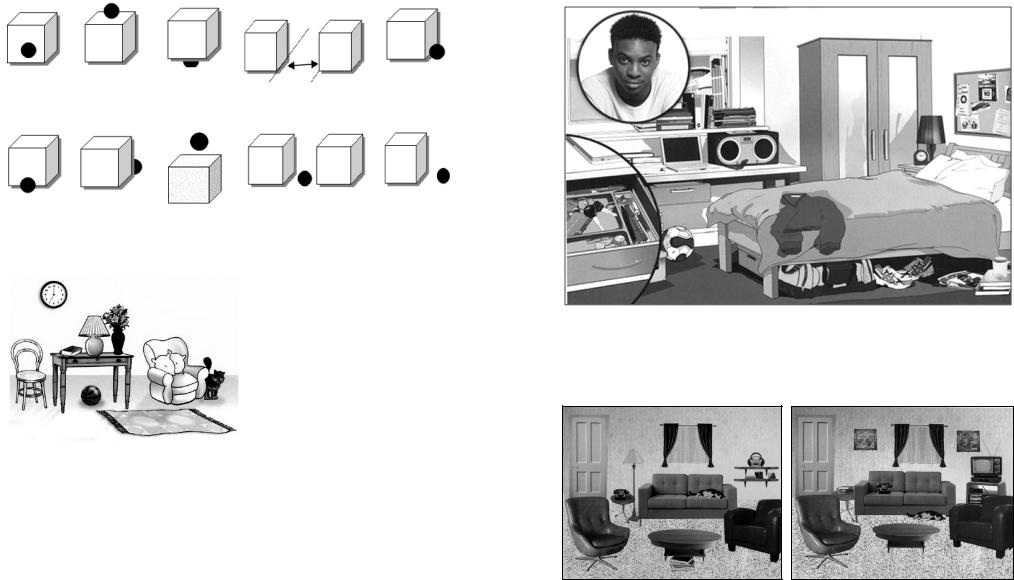
14
3.5 Match the prepositions and pictures. Use between, next to/beside, on, under, above/over, in, opposite, behind, in front of, near.
15
3.8 Describe Rory’s room. Use the prepositions of place.
a. b. c.
f. g. h.
3.6 Complete the sentences about the picture.
i.The cushions are ___ the armchair.
3.7Listen to Jerry and his mum.
What is she looking for?
a.TV remote control
b.lamp
c.cat
Where is it?
a.on the sofa
b.behind the sofa
c.under the sofa
d.e.
i.j.
a.The lamp is on the table.
b.The flowers are ___ the vase.
c.The cat is ___ the armchair.
d.The ball is ___ the table.
e.The clock is ___ the table.
f.The chair is ___ the table.
g.The carpet is ___ the table.
h.The lamp is ___ the vase and the book.
4. Listening
4.1 Look at the pictures of rooms. What is different?
4.2 Listen to a description of one of the rooms. Which room is it?
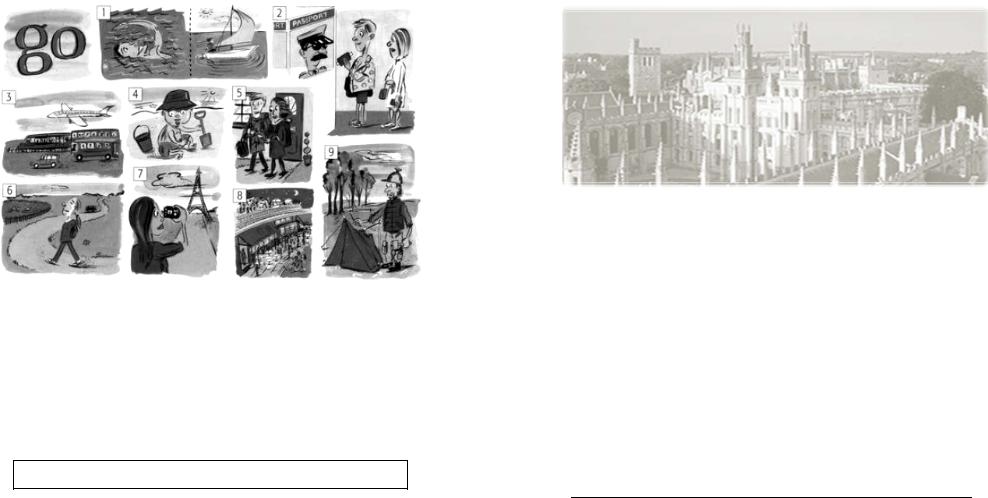
56
2. Vocabulary and speaking
2.1 Match the verbs and pictures.
□go abroad
□go swimming/sailing
□go sightseeing
□go camping
□go by car / bus / plane / train
□go to the beach
□go out at night
□go away for the weekend
□go for a walk
2.2Complete the phrases with the verbs from the box.
buy have hire meet rent spend stay sunbathe take walk
a._____ in a hotel/campsite
b._____ photos
c._____souvenirs
d._____ on the beach
e._____ a good time
f._____ time/money
g._____an apartment
h._____ in the mountains/around the place
i._____ friends
j._____ a car
29
Module 4
A LIFE OF LEARNING
These are five of the oldest higher schools of the world. Match the names of the universities and the countries of their location.
Harvard University |
England |
Oxford University |
Czech Republic |
University of Bologna |
Spain |
University of Salamanca |
USA |
Charles University of Prague |
Italy |
1. Pronunciation
Listen and repeat the subjects. What do you call a person who is a specialist in them? Listen and complete the list. Mark the stress and pronounce the words.
a. |
physics |
physicist |
b. |
philosophy |
… |
c. |
psychology |
… |
d. |
sociology |
… |
e. |
architecture |
… |
f. |
history |
… |
g. |
mathematics |
… |
h. |
chemistry |
… |
i. |
astronomy |
… |
j. |
engineering |
… |
k. |
public relations |
… |
2. Reading and vocabulary
2.1 Read the text about higher education in Great Britain. Check the meanings of the underlined words with a dictionary.
In Britain your first degree is a BA (Bachelor of arts or humanities) or a BSc (Bachelor of science). If you do post graduate study, you can get an MA (Master of arts or humanities) or an MSc. After some years of original research and publishing a thesis, you can get a PhD (Doctor of Philosophy). Undergraduates usually write essays. A long essay is called dissertation. A thesis is longer still and contains original research.
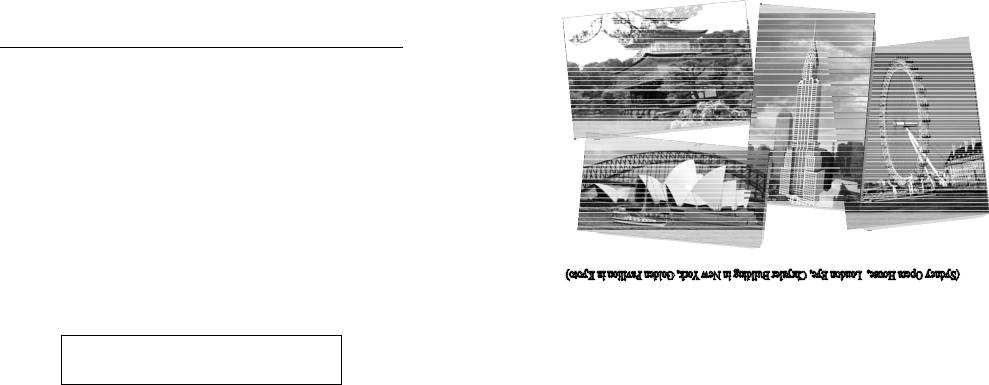
30
University teachers are called lecturers. In the UK the heads of university departments and some very important academics are Professors. A university usually consists of faculties, or colleges. They are headed by Deans. The head of a university can be called Rector, Chancellor, Master or Principal.
Going to university is expensive. First, there are the tuition fees. If you live away from home, you have to pay for your accommodation. University halls of residence are not cheap. Some students get a grant, but most have to take out a student loan from the bank.
2.2Complete the sentences with the words from 2.1.
a.Higher education means doing a ____ at a university.
b.There are students’ protests against high ____ ____ in Britain these days.
c.In the USA ____ ____ ____ are called dormitories.
d.A student ____ can take years to pay off.
e.A ____ is a person who gives lectures.
f.In UK, a head of a faculty must be a ____.
g.If you are good at sport, you can apply for a ____.
h.The mathematics ____ at Moscow State University is very popular and prestigious.
i.This website helps students find ____ if they plan to live away from home.
j.Students who do their first degree are called ____.
k.If you complete your first university degree, you become a ____.
l.The Master’s ____ is a long essay.
m.The Doctor’s ____ must contain original research.
2.3Use the words form the box to complete the sentences.
graduation academic assignment specialise
tutorial term seminar course
a.The …… year begins in September and runs to the end of June.
b.Next year I have to decide which area of medicine I want to …… in.
c.It’s my first …… at university, and I don’t know many things about it yet.
d.I’m doing a …… in business administration.
e.On Tuesday I have to give a short presentation at my History …… .
f.Dr Barnes is very helpful and friendly when you have a …… with him.
g.When I have a big ……, I have to spend several evenings to do it.
h.It’s my …… ceremony next week. My parents are very happy for me.
55
Module 7
GOING PLACES
When was the last time you travelled? Where did you go?
Where would you like to go? What do you want to see or to do there? Do you know where these tourist attractions are?
1. Pronunciation
1.1 Which irregular verb has a different sound? Listen and check.
1. sent |
made |
went |
said |
2. bought saw |
told |
caught |
|
3. put |
spoke |
took |
could |
4. paid |
said |
made |
came |
1.2How do you pronounce –ed in these sentences? Listen and repeat.
a.We booked a holiday.
b.We sunbathed.
c.They rented a house.
d.We decided to go to Sweden.
e.We walked to the hotel.
f.We argued all day.
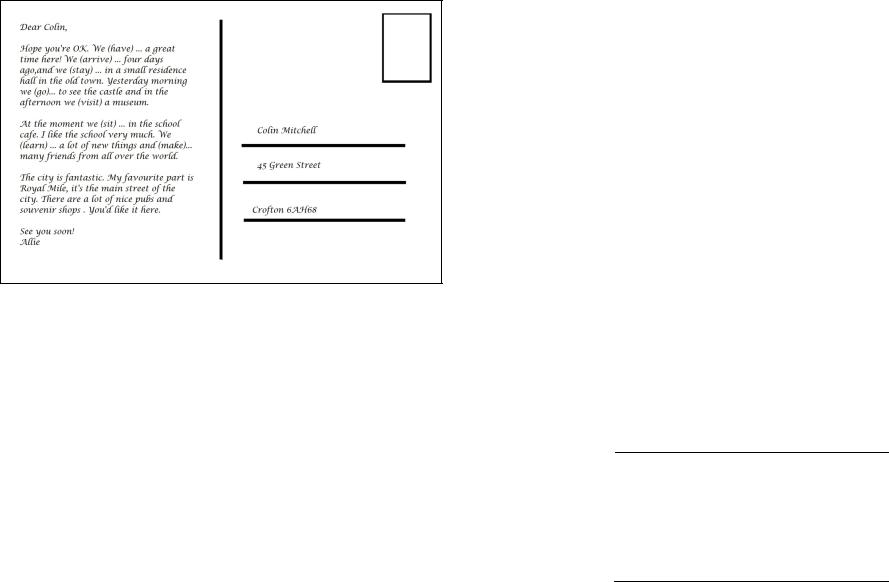
54
OVER TO YOU:
1.Can you describe your life at university?
2.Can you say what you usually do and what you are doing this week?
3.Can you describe student activities at university?
31
3. Grammar
3.1Which words are missing in these sentences? Use 2.1 and 2.2 for help.
a.If you are good at sports, you …… apply for a grant.
b.Most students …… take a student loan from the bank.
c.If you live away from home, you …… pay for your accommodation.
d.If you do post-graduate study, you …… get an MA or an MSc.
3.2Read the sentences. What is the meaning of CAN in them? Sometimes both are possible.
1.I can do it. = I know to do it. 2. I can do it. = It’s possible for me to do it.
a.I can speak two languages.
b.I can do an MSc after I get my Bachelor’s degree.
c.We can’t play loud music in the hall.
d.Can I apply for this grant?
e.I can pay for my accommodation myself.
f.You can’t swim, can you?
3.3Listen to the sentences. Are the positive or negative? Listen again and repeat.
3.4Make sentences about yourself. Use CAN or CAN’T.
e.g. speak Chinese – I can’t speak Chinese.
a.speak German
b.run 20 kilometers
c.sing very well
d.play a musical instrument
e.swim
f.play football
g.ride a bicycle
h.understand my teacher of English
3.5Listen and complete the conversation.
Can you sing?
………
Can you play a musical instrument?
………
What can you play?
………
Can you dance?
………
Listen again and repeat. Copy the rhythm.

32
3.6Listen and answer the questions for yourself. Give true answers. e.g. – Can you speak English? – Yes, I can, but not very well.
3.7Read the adverts from a newspaper and act out job interviews.
Classifieds
Musician wanted. A newly |
Secretary wanted. German, good |
formed band needs a front |
English, computer skills, office |
man/guitarist/composer. |
machines. |
Health Club looking for sports |
Family with two small kids |
instructor. Winter sports. |
looking for a baby sitter. |
|
Weekends, evenings, cooking, |
|
driving kids from school. |
3.8 Look at the pictures and match them with the correct sentences.
1. |
You have to show your |
1. You have to smoke |
1. |
You have to switch off |
passport. |
here. |
your mobile. |
||
2. |
You can show your |
2. You can’t smoke here. |
2. |
You don’t have to |
passport. |
|
switch off your mobile. |
||
3.9Make sentences about your studies. Use HAVE TO or DON’T HAVE TO.
a.Students ____ wear a uniform.
b.Students ____ take exams.
c.They ____ to pay for their accommodation.
d.All students ____ pay tuition fees.
e.You ____ get up early every day.
f.You ____ speak English at your English lessons.
g.You ____ do reading for seminars.
h.You ____ pay off a student loan.
3.10Listen and agree/disagree with the sentences.
e.g. – You have to wear a uniform. – No, I don’t have to wear it.
53
7.2Make sentences suitable for the situations.
a.Switch off/on – light – read
b.Put away/give back – dictionary – use
c.Turn on/off – radio – listen
d.Walk/stay away – floor – clean
e.Take/give back – pen – write
8. Writing
8.1 Look at the two postcards. Do you know which cities these are?
8.2Read Allie’s postcard. Which postcard is it? What is Allie doing there? Put the verbs in the postcard in the correct form.
8.3Write a short letter to your friend in another town about your studies at university. Give this information.
9Where are you living?
9What are you studying?
9Are you having a good time?
9Are you taking part in student activities?
9Say something about the town.
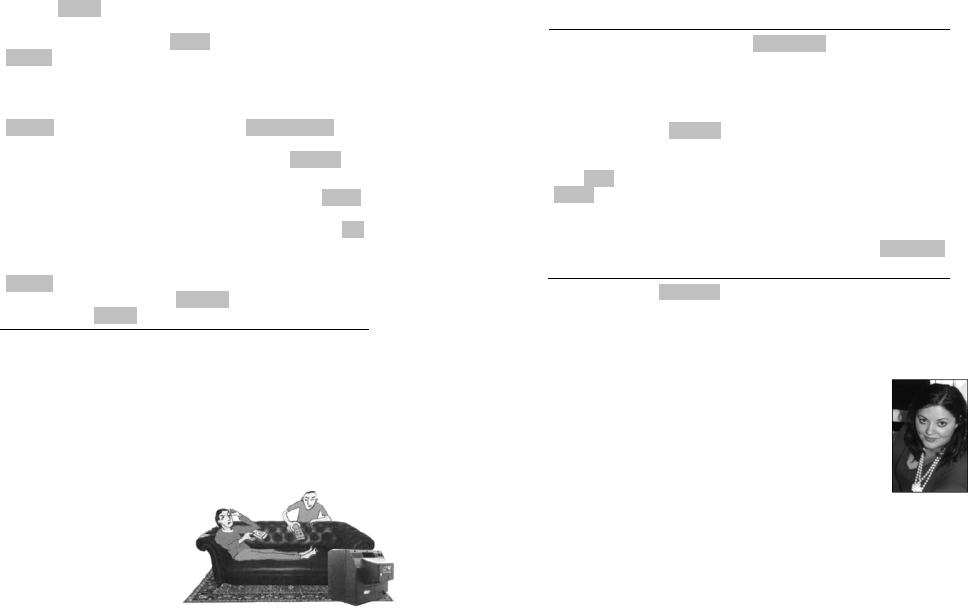
52
2.Life on campus gives you opportunities to make friendships that last a lifetime. We have many programs and resources here for your academic careers – and engage you in the rich culture and diversity of this university.
3.One of the best parts of being a college student is getting involved. WMU has over 300 student clubs and organizations that you can choose from paintball to student government. Student activities help you make friends, develop leadership skills, and become part of WMU. The academic year starts in September when 25,000 students and visitors get together to celebrate the beginning of the school year.
4. During your college career here, you can take time to stay fit. University Recreation has fitness classes, intramural sports, and other options to keep your mind and body in peak condition. Join a climbing clinic on the 45 foot climbing wall!
5. We also have the Students' Union in Europe. It runs hundreds of societies and campaigns. Join a student organization, work on campus, join a fitness class, or volunteer your time – the Student
Union is here to support you.
a.Stay healthy
b.Get involved
c.Welcome to student life
d.The Union support
e.Experience campus life
6.2Check the meaning of the highlighted words with a dictionary. Make your own sentences with them.
7. Conversation patterns
7.1 Listen and complete the phrase.
Don’t ____ the TV, I’m watching it.
Please, ____ it ____ again!
33
4. Reading and speaking
4.1 Read about the Open University in the UK. How is it different from other universities?
The Open University (OU) is a British long distance learning institution. It allows all kinds of people to study for a degree. Housewives, grandfathers, busy workers, and people with health disabilities (ограниченные физические возможности) can do a bachelor degree course.
You can have almost unlimited time to complete a degree. The students choose how many modules to do each year, until there are enough (достаточно) for a degree. So they can continue to work and study in their spare time. The time of exams and assignments, however, is not flexible, so self discipline is very important.
The OU uses various methods for distance learning, for example, written and audio materials, the Internet, television programmes and materials on DVD. For most courses, students contact with tutors at face to face tutorials, by telephone, and/or on the Internet.
Guess the meaning of the highlighted words. Check it with a dictionary.
Make 5-6 sentences about OU students and what they have to/don’t have to do to complete a degree.
e.g. OU students have to take exams. or OU students don’t have to live in university accommodation.
4.2 Roxy Freeman is a web journalist, a loving mother of two children and an Open University student. In her blog she often writes about her studies there. Interview Roxy about her life, and act out the conversation.
e.g. – Do you have to work? or How often do you have to contact your tutor?
5. Reading and listening
5.1Read the text and answer the questions.
a.Who has to study longer, a technologist or an engineer?
b.Which is higher in educational context, a diploma or a degree?
c.Can you get BEng at college in the UK?

34
Can ‘sandwich’ course students work and study at the same time? What is the difference between a technologist and an engineer? The main difference is in level of education and training. Engineers have advanced training and normally hold university degrees.
In training contexts, a technologist is normally someone usually trained for 2 3 years. You can progress from technologist to engineer by following courses at colleges and universities. Colleges offer certificates and diplomas (a diploma is a higher level qualification than a certificate). Universities offer degrees.
As an example, in the UK system, most young people who want a career in technology start by studying at a college of further education or university. They would normally follow the scheme: HNC (Higher National Certificate), HND (Higher National Diploma), BEng (Bachelor of Engineering degree). Some universities allow students to transfer to a degree course early, after completing only one year of a diploma course.
It is also possible for students to leave school at sixteen and work as an apprentice with a company. The company can then release them from work for some time every week to study at a college. This is called a part time, or ‘sandwich’ course.
5.2In the text find the words which mean the following.
a.a person who learns through work
b.to develop in a positive way
c.more complex, high level
d.profession, life occupation
e.to move from one course to another
f.to let someone go
g.post-school education, but not at university
5.3Alex is a college student from Scotland. He takes an HND course in Civil Engineering. Civil engineers work in the planning and construction of buildings, airports, bridges, highways etc. Listen to him and mark the sentences True or False. Listen again and check your answers.
a.The course takes two years.
b.Alex is in the second year.
c.There are no girls in his group.
d.Alex wants to do a degree at university.
e.He wants to take Structural Engineering.
f.A BEng takes three years.
g.Alex is interested in building roads.
h.He wants to travel in his job.
51
a.you/have/a good time?
a.you/stay/in a hotel?
b.they/enjoy/it?
c.you and your wife/relax?
What are Nigel’s answers?
Act out the conversation.
5. Speaking
5.1Complete the sentences about Nigel and his family.
a.Nigel lives in a house in Manchester, but now he is staying in a house by a sea.
b.He usually wears a suit, but now …….
c.He never relaxes at work, but today ……
d.Karen works in a shop, but today ……
e.The children study hard at school, but now …….
f.It often rains in Britain and …….
5.2Answer the questions about yourself.
a.What do you usually wear?
b.What are you wearing now?
c.What books do you usually read?
d.What are you reading this week?
e.What do you usually do at English lessons?
f.What are you doing at this lesson?
g.Do you live with your parents?
h.Are you living with your parents these days?
5.3Think of three habits/things that you normally do. Are you doing it now/these days?
6. Reading
6.1 Read the article about student life at Western Michigan University. Match the paragraphs and the headings.
1. Life outside the classroom is an exciting part of your college
experience. There are a lot of opportunities here to meet new
people, join student organizations, work on campus, and live in the residence halls.
